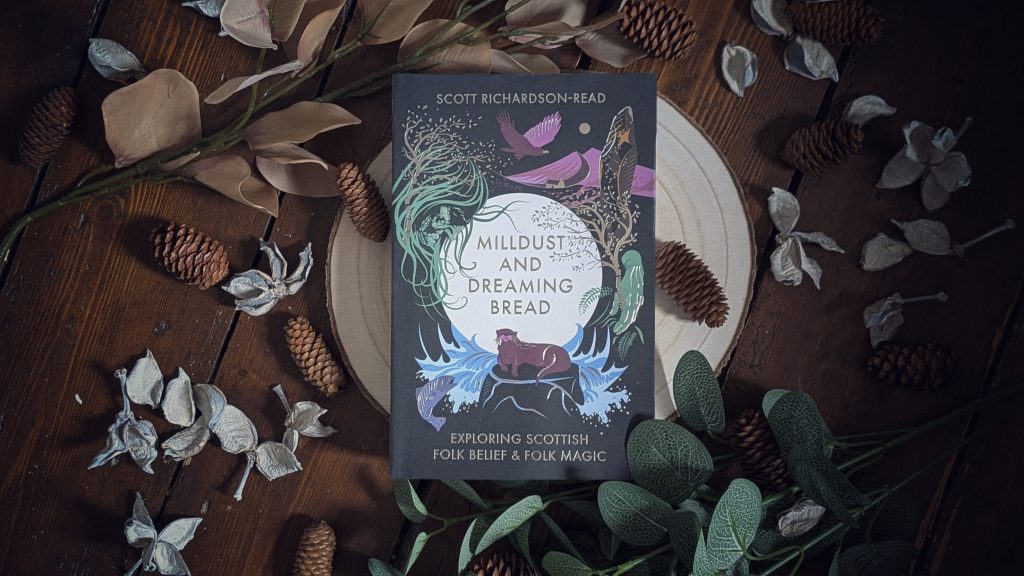
Milldust and Dreaming Bread: Inside the magical world of Scottish folk tales
Scotland is a nation rich in history, folk tales and folk magic. Author Scott Richardson-Read spent many years collecting and investigating these tales and traditions, compiling his thoughts and findings into the wonderful Milldust and Dreaming Bread.
From the moment you open the book you are presented with pages rife with folk belief, witches, fairies, charms, cosmology and traditions; all weaving together to form a tapestry of life in Scotland over the centuries.
With such a plethora of folk beliefs, traditions and tales, Milldust and Dreaming Bread (MDDB) could easily have spanned many more pages than its current form. Yet, Scott managed to curate the content, offering much insight into the lives of our Scottish ancestors without an overload of information.
‘It might sound a bit odd, but I let my feet guide me,’ Scott says when asked how he chose which tales and beliefs to include.
‘The stories in the book are the ones I gathered along the way. By “gathered,” I mean heard, stumbled across, or found through conversations and shared moments with storytellers and friends who know far more than I ever will. They’re the ones that made themselves known.’
As you explore the landscape of Scotland’s ancestral traditions within yourself, you will discover a strong connection to place, to the land and to community, along with animistic beliefs running like a central root feeding and connecting many aspects of life.
It becomes clear that this belief that everything holds its own distinct spiritual essence informed the way of life for Scots, especially of the working class.
It also becomes clear that these beliefs and practices have diminished in the current landscape of Scottish life. Are there things we can learn from our ancestors’ outlook? Are there lessons to be discerned and adopted once more when it comes to hospitality and community?
Within the book, Scott writes of having animate views of the world through community going on to relate this to ‘your postie [being] a gifted folk herbalist’ or ‘your taxi driver [having] a knack of knowing when to be in a certain place.
When asked what he would be capable of, Scott replied, ‘I suppose I’d love to always know the right thing to say to make people feel welcome, seen, and at ease.

‘The kind of hospitality and comfort that used to be second nature in community life – I think we’re in danger of forgetting how powerful that really is.’
Another aspect of our ancestors’ belief system that seems to be less well-remembered, yet thankfully still kept alive at events across the country, is the marking of the seasons and passing of time through festivals.
In part three of MDDB, Scott reintroduces us to the many moments of celebration that punctuated the calendar for our ancestors. The vibrant telling gives life to these moments in a way that powerfully calls to your inner Scot.
After all the hard work writing the book and the positive response upon its release, Scott remains humble about the topic he chose to dedicate a large amount of his time to.
‘I’ve never been comfortable claiming expert status on something that belongs to the people,’ he said.
‘These are shared stories, shared beliefs – I just want to hold a space where we can share more of them.’
And he has done just that, inviting conversation on what he shares on the pages of MDDB, imploring readers to partake in their own further reading and visit the oral storytellers that hold rare tales that will never appear on Scott’s pages out of respect for the storytellers art and the tradition.
Head along to any of Scott’s events involving MDDB and you won’t be attending the usual reading and question time event of some book tours. Instead, you will be part of an ‘exchange of knowledge’, a discussion of the topics between the book’s covers and other stories those in the audience may bring with them.
I’ll leave you now with some final words from Scott, words that perfectly encapsulate the essence of MDDB.
‘[MDDB] is for anyone who loves Scottish history and folklore, who dreams of a different way of living, or who’s curious about folk belief – what it meant, why we followed it, and what it still offers today.
‘It’s for seekers, storytellers, and anyone who feels the pull of old stones and the whispers of the land. This book is for those who want to connect with the echoes of an ancient place and consider how those echoes might help us face the challenges of now.’
A magically crafted compendium, Milldust and Dreaming Bread is available now. And with such a plethora of information to discover and share, perhaps this won’t be the last we hear from Scott on the folk beliefs and magic of Scotland.
For more information on Milldust and Dreaming Bread or to find more of Scott’s work with Scottish folk beliefs and magic, visit https://cailleachs-herbarium.com/
Read more of The Good Books here.
Subscribe to read the latest issue of Scottish Field.
TAGS

